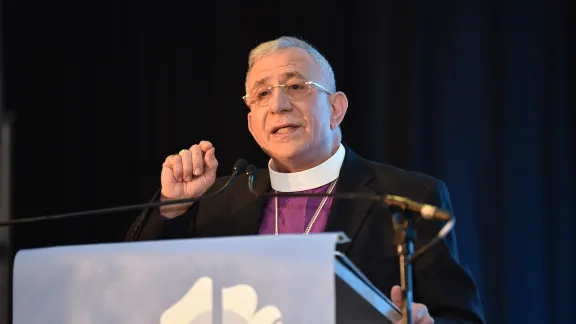
The Lutheran World Federation (LWF) President Bishop Dr Munib A. Younan addressing participants on the opening day of the Twelfth Assembly of the LWF in Namibiaâs capital Windhoek. Photo: LWF/Albin Hillert
President’s address to Twelfth Assembly calls for deeper sense of an interdependent communion
The Lutheran World Federation (LWF) President Bishop Dr Munib A. Younan today encouraged members of the worldwide communion of churches to capture Luther’s drive to reform, rebuild and remake the church in a spirit of repentance and faithfulness to the Gospel of Jesus Christ.
Addressing participants on the opening day of the 10-16 May Twelfth Assembly of the LWF in Namibia’s capital Windhoek, Younan said while it was important to remember the history of the 16th century Reformation and the men and women who made it possible, “it is also essential that we seek out the spirit of freshness and freedom, with which the Holy Spirit moved then and continues moving today.”
His address was on the Assembly theme, “Liberated by God’s Grace,” which is also the focus of the global commemoration of 500 years of the Reformation this Sunday at the Sam Nujoma Stadium. The LWF president highlighted some of the challenges in today’s world and how the communion of churches might respond.
Freedom within community and in communion
We are called to follow the Spirit as she works on the margins of the world, proclaiming how God refuses to forget the weak and condemned, the betrayed and the occupied, those ignored by the centers of worldly power.
“We are called to follow the Spirit as she works on the margins of the world, proclaiming how God refuses to forget the weak and condemned, the betrayed and the occupied, those ignored by the centers of worldly power,” said Younan, bishop of the Evangelical Lutheran Church in Jordan and the Holy Land (ELCJHL).
Churches are called to cultivate a spirit of liberation, the freedom to ask each other tough questions. “The interdependence of our communion reminds us, however, that these challenges are not personal or individual exercises; we question and we discern within community and in communion,” he added.
Toward an ecumenical spring
Turning to the processes of historic reconciliation in which the LWF has been engaged, he said the October 2016 joint Catholic-Lutheran Commemoration of the Reformation at Lund and Malmö, Sweden, was profoundly significant for the ecumenical movement, and had charted the way forward from conflict to communion. He expressed his hope that the sharing of prayer and mission manifested at the event alongside many other movements in the last decades of Lutheran-Catholic dialogue “will lead to further breakthroughs of an ecumenical spring.”
The LWF president said the joint statement he signed with Pope Francis gives him hope for further work on issues where the two dialogue partners do not agree, namely, ecclesiology, ministry and Eucharist. He spoke of his strong conviction that “Christ’s table of generosity” was not based on one’s Christian tradition, and encouraged the communion to continue to dialogue in response to Christ’s call “to have one Baptism and one Table for the Eucharist.”
LWF leadership in a religiously diverse world
In the spirit of ecclesia semper reformanda – the church in ongoing reform – Younan encouraged Lutherans to “argue with Luther” even as they receive with gratitude his explicit and clear theology of justification by grace through faith. Just as the LWF had taken strong steps to reverse Luther’s condemnations of the Catholic Church and repudiated his writings on Jews and Judaism with the 1984 LWF Assembly statement, the communion should also state its disagreement with his writings on Islam and Muslims, the president noted.
The ELCJHL bishop said such self-critical approach can help to combat the legitimacy of religious exclusion and extremism emerging from misguided interpretations of any faith traditions including Buddhism, Christianity, Hinduism, Islam and Judaism.
Reconciliation and healing of memories
Younan thanked the United Church Council of the Namibia Evangelical Lutheran Churches (UCC-NELC) for hosting the Twelfth Assembly. He also recognized the contribution of Lutheran churches in Namibia to the people’s struggle for independence and for promoting unity.
The LWF president referred to a recent document by the Evangelical Church in Germany (EKD), in which the Protestant church body confesses to Namibians and to God for unjustifiable German colonial crimes, and asks for forgiveness. He offered LWF’s support towards Namibia’s reconciliation process with Germany, and emphasized the need to acknowledge and honor memories of past injustices in order for healing to occur.
Gratitude
As he concludes his seven-year term as president, Younan expressed gratitude to LWF General Secretary Rev. Dr Martin Junge, the Meeting of Officers and church leaders worldwide who have supported him.
Thank you for allowing me to lead our communion.


